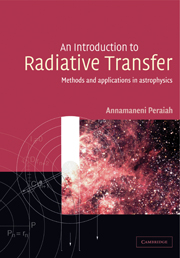Book contents
- Frontmatter
- Contents
- Preface
- Chapter 1 Definitions of fundamental quantities of the radiation field
- Chapter 2 The equation of radiative transfer
- Chapter 3 Methods of solution of the transfer equation
- Chapter 4 Two-point boundary problems
- Chapter 5 Principle of invariance
- Chapter 6 Discrete space theory
- Chapter 7 Transfer equation in moving media: the observer frame
- Chapter 8 Radiative transfer equation in the comoving frame
- Chapter 9 Escape probability methods
- Chapter 10 Operator perturbation methods
- Chapter 11 Polarization
- Chapter 12 Polarization in magnetic media
- Chapter 13 Multi-dimensional radiative transfer
- Symbol index
- Index
Chapter 11 - Polarization
Published online by Cambridge University Press: 05 June 2012
- Frontmatter
- Contents
- Preface
- Chapter 1 Definitions of fundamental quantities of the radiation field
- Chapter 2 The equation of radiative transfer
- Chapter 3 Methods of solution of the transfer equation
- Chapter 4 Two-point boundary problems
- Chapter 5 Principle of invariance
- Chapter 6 Discrete space theory
- Chapter 7 Transfer equation in moving media: the observer frame
- Chapter 8 Radiative transfer equation in the comoving frame
- Chapter 9 Escape probability methods
- Chapter 10 Operator perturbation methods
- Chapter 11 Polarization
- Chapter 12 Polarization in magnetic media
- Chapter 13 Multi-dimensional radiative transfer
- Symbol index
- Index
Summary
We shall study the state of polarization of the radiation field in this chapter. We need to study the scattering problems exactly since light is generally polarized on scattering. A good example of this is Rayleigh scattering. An initially unpolarized beam of radiation when scattered at an angle Θ to the direction of the incident beam becomes partially plane polarized in the ratio 1 : cos2 Θ in the directions perpendicular and parallel to the plane of scattering, which is also the plane of the direction of the incident and scattered of radiation. The diffuse radiation field arising out of the scattering of light in the atmosphere must therefore be partially polarized and we need to formulate the transfer equation correctly and conveniently, so that many important problems such as polarization in stellar (or solar) planetary atmospheres (including that of sunlit sky) are studied correctly.
There are several polarization observations of stars, for example the T Tauri stars which emit linearly and circularly polarized radiation (Bastian 1982, 1985, Nadeau and Bastian 1986). Magalhãs et al. (1986) obtained polarimetric observations of the semi-regular variable L2 Puppis.
Any radiation field is described by four parameters: (i) the intensity, (ii) the degree of polarization, (iii) the plane of polarization and (iv) the ellipticity of the radiation at each point and in any given direction. However, it is very difficult to include such diverse parameters – intensity, a ratio, an angle and a pure number – in any symmetrical way in formulating the transfer equation.
Information
- Type
- Chapter
- Information
- An Introduction to Radiative TransferMethods and Applications in Astrophysics, pp. 362 - 415Publisher: Cambridge University PressPrint publication year: 2001
